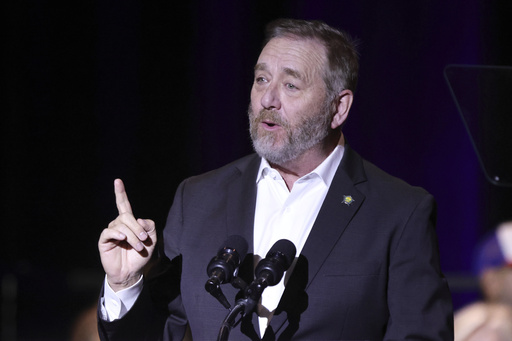
COLUMBUS, Ohio — The Ohio Supreme Court convened on Wednesday to hear arguments in a protracted public records dispute involving the state’s attorney general and a national advocacy organization scrutinizing his connections to the Republican Attorneys General Association (RAGA).
The core of the case centers around whether Attorney General Dave Yost, a Republican, is obligated to submit documents requested by the Center for Media and Democracy (CMD). These documents are related to RAGA and its fundraising affiliate, the Rule of Law Defense Fund. Additionally, Yost’s legal team is contesting a lower court’s directive that mandates the attorney general to provide testimony in this five-year-old legal matter.
The CMD is pursuing information from a time when RAGA, a nonprofit organization that receives corporate funding, coordinated a letter denouncing clean air regulations to the U.S. EPA, which was signed by various Republican attorneys general. Furthermore, RAGA has faced scrutiny for its role in encouraging supporters of then-President Donald Trump to rally at the U.S. Capitol on January 6, 2021.
During arguments, Ohio Solicitor General T. Elliot Gaiser cautioned that the court’s decision could set a significant precedent regarding public records legislation in Ohio. “If a deposition of the attorney general is permitted, it could lead to an environment ripe for abusing public records laws for political purposes,” he stated.
The CMD initially sought these documents back in March 2020, requesting information linked to RAGA’s winter meeting held that year. Yost’s office responded by claiming it had no relevant records or that the information requested did not qualify as a public record. Following a legal challenge from the CMD, a magistrate from the Tenth District Court of Appeals instructed Yost’s office to respond to specific inquiries about communications and also mandated that certain documents be made available for private examination.
The lower court determined that reviewing the materials would clarify whether they were indeed public records, depending on criteria such as whether the communications occurred during state business or involved public employees carrying out official responsibilities.
Yost is appealing the orders, asserting that retrieving the required documents could intrude into the communication records of Republican attorneys general from other states, as well as personal and campaign emails of his own staff. He has expressed concerns that the effort could inadvertently include irrelevant communications unrelated to RAGA or its fundraising activities — for instance, discussions related to multistate lawsuits involving parties like electronic cigarette companies or Google.
Chief Justice Sharon Kennedy queried if the lower court’s requisition was overly burdensome for the state, suggesting that it may be asking for information rather than records. Justice Jennifer Brunner, the only Democrat on the panel, raised concerns about the implications of allowing public officials to independently judge whether certain records should be classified as public.
Brunner cautioned, “If this ruling goes a particular way, it could enable officials to engage in unethical behavior while solely using private emails, shielding such actions from public scrutiny.”
CMD’s attorney, Jeffrey Vardaro, reminded the court that the outstanding order would only allow the Tenth District magistrate — not the CMD or the general public — to scrutinize specific documents. He argued that this approach undermines the notion that the lawsuit is meant to intimidate or embarrass Yost, who is responsible for enforcing Ohio’s public records law.
Vardaro warned against a ruling that would empower public officials to decide that significant categories of public records could be deemed private and prevent judicial review. He emphasized, “Such a decision would effectively transform the Sunshine Act into a black box, obstructing transparency.”

